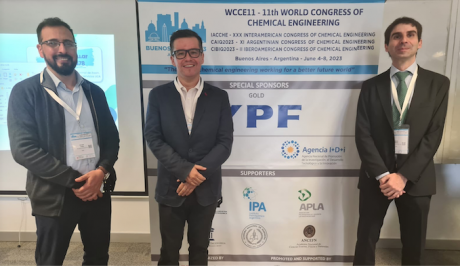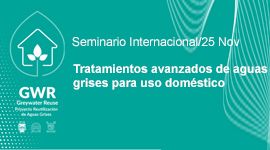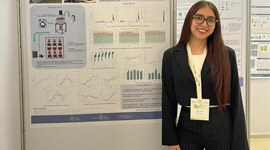You are here
GWR Project at the World Congress on Chemical Engineering

Part of the scientific team of the GWR Project, Greywater Reuse, arrived at the trans-Andean capital to present the initiative, which proposes solutions to the water shortage, at the Eleventh World Congress of Chemical Engineering, within the theme of Sustainability and Environment. Esteban Quijada, Julio Romero and Ricardo Abejón, doctoral students and academics from the Faculty of Engineering of the University of Santiago de Chile (Usach), attended the event and presented the research: "Integrated Technologies for the Treatment and Reuse of Domestic Graywater in the Chilean Context".
The project director, Dr. Esteban Quijada, emphasized the importance of presenting the innovation at the summit of the field: "The World Congress of Chemical Engineering is a great showcase for our project at the Latin American and international levels, establishing the importance of graywater reuse. It also opens up opportunities for collaboration and the creation of international networks. In this sense, we received very good comments and attention to what was proposed by the project".
Dr. Ricardo Abejón, co-director of the GWR Project and responsible for the presentation, highlighted the high level of interest in the research presented: "The proposal to treat and reuse high quality water, including drinking water, has generated a lot of interest. It represents a breakthrough compared to traditional uses for irrigation or toilet flushing with treated water of lower quality".
The researcher explained that the context of climate change puts strategies to face the water crisis in the foreground, "since drought is already a global problem, with a change in rainfall patterns, so there is a great awareness of the importance of improving the water resources management and implementing the circular economy in this area as well".
According to Dr. Abejón, "the technological integration proposed by the project, with compact equipment that is easy to install, together with the development of a link with sustainable construction and architecture, to see the best ways to implement these processes in housing" attracted a lot of attention.
"The project, especially in terms of high quality water recovery, can be an innovation at a global level. What we usually see are much simpler treatments," said the researcher.
The first version of the World Congress of Chemical Engineering (WCCE) was held in 1976 in Amsterdam, and since then it has been held regularly every 4 or 5 years. In this version, 13 thematic areas were included: Chemical Engineering Sciences; Chemical Reaction Engineering and Catalysis; Process Systems Engineering; Biotechnology, Bioeconomy and Bioindustries; Food Engineering; Renewable and Non-Renewable Energy; Materials and Nanotechnology; Process Intensification, New Innovative Processes, Process Industries; Industry 4.0, Smart Factory, Big Data; Chemical Engineering Education; Process Safety; Sustainability and Environment; and Business and Project Management.
News
 A successful seminar was held on advanced gray water treatment and...
A successful seminar was held on advanced gray water treatment and...
 The international academic network will present its advances in gray...
The international academic network will present its advances in gray...
 The GWR Project attended the Chemical Engineering Congress.
The GWR Project attended the Chemical Engineering Congress.

